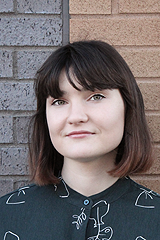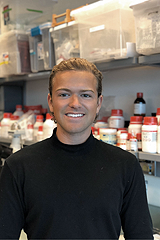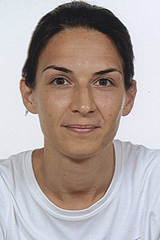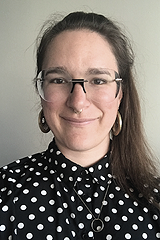![]()
The MDCM Class of 2020, circa December 2017 in the Strathcona Anatomy & Dentistry building. (Photo courtesy of the Class of 2020 Council)
The ongoing COVID-19 pandemic meant holding a traditional Convocation ceremony for 2020 graduates was out of the question, not only at McGill University, but at educational institutions across the globe. With plans in the hopper to celebrate this important milestone in one’s life in person in 2021, a series of virtual ceremonies were held on June 18 and 19, with Health Sciences students seeing their names on the screen during the first video, which premiered on the morning of June 18. In addition to receiving their diplomas, officially earning the right to be called “Doctor” after years of hard work, for a number of graduates, the moment is made even more special with the attribution of the annual awards to the graduating MDCM Class. We asked several of the award recipients to share their thoughts about their time at McGill, what being selected for their award means to them, and their advice for future MDCM students. Here’s what they had to say.
On their time at McGill
“I have been fortunate to call McGill my second home for the past seven years,” says Dr. Kelly Hennegan, recipient of the Alexander D. Stewart Prize. “I completed a Bachelor of Science degree (Pharmacology ’16) right before medical school and will be starting a McGill Family Medicine residency in July. I have always found the McGill community to be very special. In and outside of Medicine, I have been able to work with very passionate students whose talents shine across multiple domains. Many of my fondest memories have taken place outside of the classroom, with students whose personal and professional backgrounds were markedly different than my own. Regardless of our varied programs, McGill students are united by our work ethic, community spirit, and unique vision for change.”
Dr. Akina Fay, recipient of the John H. Altshuler Prize in Family Medicine, points out one of the unfortunate consequences of the pandemic: not being able to say goodbye to their classmates. “My experience at McGill was nothing but positive. I will miss my classmates the most. McGill has a way of selecting candidates that leads to cohorts with so many different people from all walks of life. Everyone has a unique story that led them to medicine and has something different to offer the profession. The hardest part of COVID is not getting to say goodbye to these wonderful people, but the Class of 2020 was special, and I will never forget everyone I got to know.”
“It is so hard to capture the entirety and intensity of the last four years in just a few sentences! My time at McGill was a whirlwind of experiences and emotions – a challenge, for sure, but with incredible rewards in the form of close friendships and exceptional mentorship,” notes Dr. Caroline Franck, recipient of the Reilly Madsen Prize. “An overarching highlight was both witnessing and personally experiencing the unwavering peer support from the Class of 2020. Something this time of social isolation has highlighted for me is the importance of connection. I can say that connection and building a sense of community was a huge strength of our graduating class, and I think speaks to the caring and compassionate nature of these newly-minted physicians.”
Dr. Benjamin Mappin-Kasirer, co-recipient of the Dr. Allen Spanier Prize for Professionalism in Medicine, had the unique situation of being a member of two Classes, having spent time studying in the UK as a Rhodes Scholar. “I was originally a member of the Class of 2018, and took a bit of an unusual path by taking on graduate studies in England between my first and second years, before returning to McGill to join the Class of 2020. It was wonderful to celebrate the graduation of my original class a couple of years ago, and to be welcomed so warmly into the Class of 2020 since. I find myself lucky to have a foot in both classes. While traditional graduation celebrations weren’t possible this year, there has been an unusual opportunity to think about what being a McGill graduate means aside from the ceremony. For my colleagues and I studying medicine, I think of late nights in the anatomy lab, later nights in the hospital, the fun of clinical rotations with friends, and the chance to take part, as graduates, in the remarkable tradition of our Faculty.”
On being selected for their Convocation prize or award
“I am humbled and grateful for the recognition, although I truly believe so many students in our class are just as deserving! My personal interest in people and in their stories is a large part of what led me to want to become a physician,” says Dr. Franck. “It’s encouraging to see that the Faculty values empathy and compassion in students, as they do academic excellence.”
Dr. Mappin-Kasirer, who also received a Lieutenant Governor of Quebec Medal is thankful to many. “I owe this in large measure to Dr. Kevin Schwartzman, Dr. Liane Feldman, Dr. Abraham Fuks – all also graduates of our Faculty – and the many other professors and teachers who have been so generous with me during my studies, and have made my time at McGill so happy. I am grateful to the Spanier family, to the Faculty of Medicine, to the Lieutenant Governor of Quebec, the Honourable J. Michel Doyon. Some of my favourite McGill professors have shown me that exceptional educational opportunities are best placed in service of others, and I hope to follow their example in the years to come.”
“To have been awarded the Alexander D. Stewart Prize has been an honour and a privilege,” says Dr. Hennegan. “I am deeply humbled and will continually strive to embody the values it recognizes. Thank you to the Faculty’s selection committee, to the many clinician role models who have led by example, and to my entire cohort for their support throughout these four years.”
“Receiving a graduation prize is humbling,” adds Dr. Fay. “I showed up to the hospital daily to help my patients, help my teams and do my work. I never once went into work with the intention of winning a prize! However, I must admit that it is an honour to be recognized and to have my hard work highlighted. I am especially grateful to the families that create these awards in memory of their loved ones. The John H Altshuler Prize in Family Medicine will be a constant reminder to be better, work hard and make the profession proud.”
On advice they would share with future MDCM students
“My advice would be to keep the journey in perspective – it’s a marathon, not a sprint, and medical school is only the very beginning,” says Dr. Franck, who will be pursuing her residency in Psychiatry at the University of Ottawa. “I think it’s helpful to frame challenges as opportunities for growth and development, to focus on persistence, not perfection, and to remember that growth is rarely a comfortable process! Be kind with yourselves. We all have different and valuable strengths to bring to the table, and to our patients.”
Dr. Hennegan, who will be completing her residency in Family Medicine at the Jewish General Hospital, echoes Dr. Franck’s sentiments. “While medical school can be challenging at times, it is an experience like no other, and one that I personally would choose to do again in a heartbeat,” she says. “Becoming a physician is a journey, with many important milestones along the way. I would encourage incoming students to appreciate every moment of this journey – from the completion of their first preclinical exam, to their last day in the hospitals as a fourth-year student. Looking back, each and every one of these experiences helped me to become the person I am today. Additionally, I would encourage students to lean on their peer support network, particularly during the more difficult times. Remember that you are not alone and that there is strength in seeking assistance when needed.”
Dr. Fay, who will also be completing her residency in Family Medicine, at St. Mary’s Hospital Center, reminds students to remain focused on the patient. “One of the most important things that I learned over the years is that there is always time to be kind and connect with a patient,” she notes. “Some days, your to-do list keeps getting longer despite you running around doing your best. In these moments, it becomes tempting to hurry through clinical encounters to be more efficient. It’s so important to take that extra 30 seconds to get to know your patient, even if it’s only asking them how they are doing. This makes the patients feel heard, and it gives more meaning to your days.”
“I don’t think I am the bearer of any particular wisdom, but I do think one of McGill’s strengths is its people,” adds Dr. Mappin-Kasirer, who will be completing his residency in Internal Medicine at the Royal Victoria Hospital. “It has been such a pleasure to learn from colleagues, supervisors, administrators, and all of those who make up our community.”
Congratulations to all award and prize recipients and to all graduates!
Convocation Award and Prize winners, MDCM Class of 2020
Ke Xuan Li
Holmes Gold Medal
Founded by the Medical Faculty in 1865, in memory of the late Andrew Holmes, M.D., LL.D., Dean of the Faculty. It is awarded to the student graduating with the highest aggregate standing in the entire medical curriculum.
André Lametti
Wood Gold Medal
Endowed by Casey A. Wood, M.D., LL.D., in memory of his grandfather, Thomas Smith Wood. It is awarded for the most outstanding clinical performance achieved by a student in the Clerkship Period.
Maria Carolina Festa
McGill Alumnae Society Prize
Presented upon graduation to a distinguished student for excellence and high academic standing.
Kimberly Wong
Ronald Douglas Naymark Prize
Established by the Medical Class of 1984 in memory of Ronald Douglas Naymark, B.Sc., M.D.,C.M. (McGill), this award is given to that member of the graduating class who most enriches the life of the class in the eyes of his or her peers. The award seeks to recognize an individual who inspires trust, confidence, optimism, and enthusiasm in his or her medical colleagues. The individual is a participant in class activities and is in satisfactory academic standing.
Joannie Rochette
Strachan Alexander Hartley Award
Given in the memory of Dr. Hartley (deceased 2004), this award recognizes a student who demonstrates athletic leadership and academic excellence
Kelly Hennegan
Alexander D. Stewart Prize
Founded by the late W. Grant Stewart (Arts, 1885; Medicine, 1888) in memory of his brother, the late Alexander D. Stewart (Medicine, 1888). Awarded to the member of the graduating class who, in the opinion of the Faculty, presents in every aspect the highest qualifications to practise the profession.
Lawrence Slapcoff and Benjamin Mappin-Kasirer
Dr. Allen Spanier Prize for Professionalism in Medicine
Established in 1999 by Beverly Spanier, B.A.’67 to honour the memory of her brother Dr. Allen Spanier, M.D.,C.M.’72. Dr. Spanier was chief of the Intensive Care Unit at the Jewish General Hospital for 21 years. Awarded annually by the Faculty of Medicine to a graduating student who has maintained high academic standing and exhibited a high standard of professionalism and compassion toward patients, their families, fellow students, and University and hospital staff during the Practice of Medicine component of the curriculum.
Kimberly Wong and Amanda Try
Elizabeth Ann Munro Gordon Prize
Established in memory of Dr. Elizabeth Ann Gordon. Awarded to the member of the graduating class who, in the opinion of the Faculty, presents in every respect the highest qualifications to practise the profession of medicine and has demonstrated outstanding leadership abilities.
Caroline Franck
Reilly Madsen Prize
Established to honour the memory of Reilly Madsen who was Manager, Records and Research, Development and Alumni Relations Services. Awarded, on recommendations from faculty and students, to a student with good academic standing who had demonstrated exceptional warmth and empathy toward patients.
Ian Gerard and Lundi Ly
Scriver-Steinberg Convocation Prize in Human Genetics
Established in 2013 by Charles R. Scriver, B.A.’51, M.D.,C.M.’55, D.Sc.’07, a renowned geneticist and Alva Professor Emeritus of Human Genetics at McGill, and H. Arnold Steinberg, B.Com.’54, LL.D.’00, Chancellor of McGill, and past Senior Executive of Steinberg Inc., who began working together in the early 1970s to solve problems: some affecting the health of populations, others affecting citizens with rare genetic diseases. This prize recognizes a person with exceptional potential to translate knowledge into practice to make a difference in the well-being of patient, family, or community. Awarded by the Faculty of Medicine to a deserving graduating M.D.,C.M. student who has pursued research in the field of genetics and metabolism, or to a student who has either completed his/her Ph.D. as part of the M.D.,C.M. & Ph.D. program, or has completed his/her Ph.D. while in medical school.
Ashley Gerber
Dr. Joseph Tanzman Award
Established in 1975 in honour of Dr. Joseph Tanzman, M.D. 1927. Awarded to a medical student in any given year from the Province of New Brunswick, as a preference. If in any year no such candidate is available, the award may be made to any deserving student in the Faculty of Science. Awarded by the Scholarships Committee of the Faculty of Medicine or the Faculty of
Science as the case may be.
Rea Konci
Brian Newton Memorial Award
Established by the Class of Medicine 1985, in appreciation for the education they received at McGill, and in memory of their classmate Brian Newton, B.Sc.’81, M.D.,C.M.’85. Awarded by the Faculty of Medicine’s Committee on Student Promotions and Curricular Outcomes to the student who obtains the highest standing in the Obstetrics and Gynecology clerkship.
Antoine Richard-Lacombe
Newell W. Philpott Prize in Obstetrics and Gynecology
Established in 1986 by the Department of Obstetrics and Gynecology in honour of Newell W. Philpott, M.D. 1926, Chairman of the Department from 1943 to 1956. This award is to commemorate Dr. Philpott’s excellence as a teacher of medical students and residents as well as his many contributions in the field and to the Department of Obstetrics and Gynecology. Awarded to a graduating student for academic achievement and clinical excellence on the recommendation of the Department.
Akina Fay
John H. Altshuler Prize in Family Medicine
Established in 2006 by David Altshuler and the Altshuler family, in honour of his father, John Altshuler, B.Sc.’55, M.D.,C.M.’59. Awarded annually by the Faculty of Medicine to a graduating medical student with the highest mark in the family medicine clerkship.
Alexander Banks
Francis William Prize in Medicine and Clinical Medicine
Founded by the late J. Francis Williams, M.D. Awarded to the student obtaining excellence in the Internal Medicine Clerkship of the medical curriculum.
Annie Chabot
Montreal Children’s Hospital Prize for Pediatrics Excellence
Established in 1959 and endowed in 2011 by Dr. Harvey Guyda, former Chair of the Department of Pediatrics and Associate Executive Director of the Montreal Children’s Hospital of the MUHC. Awarded to the student with the highest standing in Pediatrics in their final year.
Florence Couvrette
Mona Bronfman Sheckman Psychiatry Prize
Established in 1953. Awarded annually to a fourth year student in the Faculty of Medicine for the highest standing in Psychiatry.
Aurélie Montagne
Psychiatry Prize
Awarded on the recommendation of the Department of Psychiatry to the student who has shown the most promise in this field.
Lawrence Slapcoff
Keenan Memorial Prize in Clinical Surgery
Established by the late Miss Charlotte Mildred Hagar in memory of the late Dr. Campbell B. Keenan. The prize will be awarded to the student in the graduating class who has shown the highest proficiency in Clinical Surgery as determined by the Chair of the Department of Surgery.
Kenza Rahmouni
Robert Forsyth Prize
Bequeathed by the late Miss Jeanie Forsyth, awarded annually to the graduating student who has shown particular ability in all branches of Surgery.
Ali Salimi
Dr. Mark Cohen Prize in Ophthalmology
Established in 2009 by Mark Cohen, M.D.,C.M.’92. Awarded annually by the Faculty of Medicine to a graduating student who has completed the M.D.,C.M. program with strong academic standing and who will be pursuing a residency in a Canadian ophthalmology post-graduate training program.
Carolanne Gagnon
H.S. Birkett Memorial Prize in Otolaryngology
Established by Miss Winifred Birkett in memory of her father, the late Dr. H.S. Birkett, formerly Professor of Otolaryngology. Given to the student who has shown outstanding performance in Otolaryngology.
Maha El Barch
E. David Sherman Award in Geriatric Medicine
Awarded to the most outstanding student in the field of clinical geriatric medicine. Awarded by the Faculty of Medicine Scholarships Committee.
Ariane Litalien
Class of Medicine 1988 Community Health Alliance Project (CHAP) Convocation Prize
Established in 2014 by the Class of Medicine 1988 in honour of their 25th anniversary of graduation, to recognize one or more medical students in the M.D.,C.M. program. The Prizes will be awarded to those who have undertaken the best community project within the Community Health Alliance Project (CHAP), with a view to affecting positive change in the society.
June 23 2020



















 Sienna Drake, Integrated Program in Neuroscience
Sienna Drake, Integrated Program in Neuroscience Kaitlyn Easson, Integrated Program in Neuroscience
Kaitlyn Easson, Integrated Program in Neuroscience












